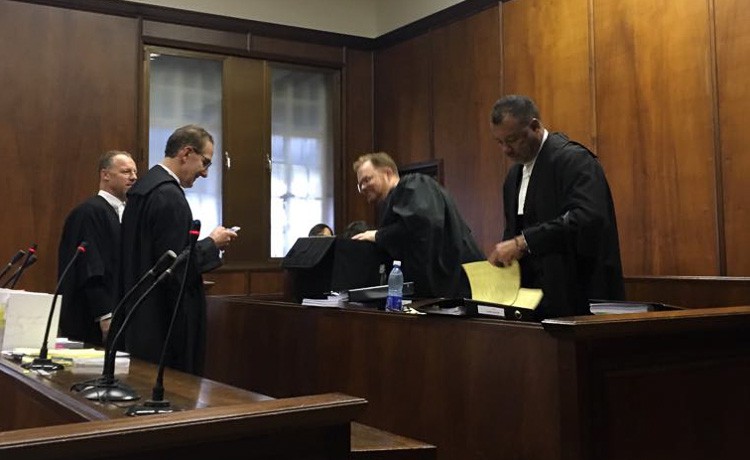Disclosure of party funding: only if it’s relevant, says DA
Not all funding information is useful to voters, argues opposition party
The Democratic Alliance argued in the Western Cape High court on Wednesday that political parties should only have to disclose funding information if this is highly relevant for voters, and then only if a request is made through the Promotion of Access to Information Act (PAIA).
This was one of the arguments put forth by the DA’s counsel, Advocate Ismail Jamie, during the second day of arguments in the case brought by My Vote Counts about the disclosure of political party funding.
On Tuesday, My Vote Counts had argued that all information regarding funding of political parties should be available, and that PAIA is constitutionally flawed because it did not allow for this.
Today, Jamie said that while the DA accepted that certain types of information relating to the funding of political parties may be “reasonably required”, there were other types of private funding information that were “almost certainly not required”.
Jamie used the example of a “Mrs Bloggs” signing up to donate R50 a month to a political party. Criticising the argument by My Vote Counts that “in order to cast an informed vote or make an informed political choice, all voters need to know, on a blanket basis, every bit of information about private political party funding”, Jamie said that knowing that Mrs Bloggs contributes R50 a month to a particular political party did not aid in the voting process.
“It is inconceivable that Mrs Bloggs’ R50 influences a party’s policies,” said Jamie. He said that the application by My Vote Counts application was “devoid of facts”.
Jamie said that the “kind of donation that does impact” would be a donation from a foreign government of a large sum of money to a political party, particularly the ruling party. However, Jamie said, PAIA could be used to access this information.
This would be “highly relevant for any voter to know” because it would be “unusual” and “most odd and suspicious.”
Jamie said the relevance of the donation would depend on who made it and how big it was.
He said he was sure the average voter would be interested if the Chinese or Russian government were donating to the ANC.
In these cases, said Jamie, any claim to anonymity would be overruled by the “express public interest”.
“It is not enough to say it would be nice to have this information … That may in a general sense be so, [but] what the law requires, is that access to that information must confer upon you a substantial advantage that you would not have otherwise,” said Jamie.
He said the situation would be the same if it were a company donating to a political party.
Jamie differed from Thabani Masuku for the Minister of Justice, who argued yesterday and today that PAIA was not the correct legislation to govern the right of access to information about political party funding and that My Vote Counts should rather focus on the Electoral Act.
Jamie told the court that the request by My Vote Counts would “seek in a most dramatic way” to infringe on Parliament’s powers. “We know funding is the lifeblood of political parties, more especially of opposition parties,” he said. Even if there was a gap in PAIA, this would be up to Parliament to remedy, he said.
Referring to the founding affidavit by DA Federal Executive Chairman James Selfe, Jamie said Selfe had stated that “almost all donations” to the DA were unconditional, meaning that they did not come with any strings attached. “Because they are unconditional, they do not influence party behaviour and do not contain information that would be useful to voters,” said Jamie.
He said people did not donate to a party to try and influence the party, but because they wanted to see that party come to power, gain traction or because they believed the party would create a better life for them.
“My submission is that the vast majority aren’t going to be swayed by anodyne information about funding,” said Jamie.
Support independent journalism
Donate using Payfast

Don't miss out on the latest news
We respect your privacy, and promise we won't spam you.
Next: Blind and diabetic in a cold little shack
Previous: Activists demand justice for Marikana massacre victims
Letters
Dear Editor
In my view all the arguments for non-disclosure of funding quoted from Adv Jamie amount to splitting hairs while the camel strolls by unchallenged.
"Who pays the piper calls the tune". To know what political party priorities are going to be after an election, we have to know who funded it before, especially during the year before, the election. Large donations given or promised/indicated in any way during the election would be most significant of all, and would be traceable if our Right To Know included all records relating to all donations that are received.
As for the unimportance of little old ladies who donate R50 per month, no party would be democratically stronger on the ground than one which received a few hundred thousand R50s from ordinary citizens. One figure for the Under R10K donors would tell this story clearly enough to indicate if further investigation might be significant.
Where were the ANC and DA on the streets of Marikana after the planned and pre-booked mortuary vans massacre of unarmed and mutely walking home workers? Which parties do the mining groups fund?
I'd love to be proved wrong by having the Right To Know, as would I be about DA funding from property developers who block integrated DA cities and so promote further geographic Apartheid.
© 2017 GroundUp. 
This article is licensed under a Creative Commons Attribution-NoDerivatives 4.0 International License.
You may republish this article, so long as you credit the authors and GroundUp, and do not change the text. Please include a link back to the original article.

